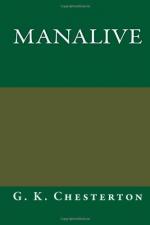“`And so,’ I said with sympathy, `you walked straight out of the front door, like a masculine Nora.’
“`Nora?’ he inquired politely, apparently supposing it to be a Russian word.
“`I mean Nora in “The Doll’s House,"’ I replied.
“At this he looked very much astonished, and I knew he was an Englishman; for Englishmen always think that Russians study nothing but `ukases.’
“`"The Doll’s House"?’ he cried vehemently; `why, that is just where Ibsen was so wrong! Why, the whole aim of a house is to be a doll’s house. Don’t you remember, when you were a child, how those little windows were windows, while the big windows weren’t. A child has a doll’s house, and shrieks when a front door opens inwards. A banker has a real house, yet how numerous are the bankers who fail to emit the faintest shriek when their real front doors open inwards.’
“Something from the folk-lore of my infancy still kept me foolishly silent; and before I could speak, the Englishman had leaned over and was saying in a sort of loud whisper, `I have found out how to make a big thing small. I have found out how to turn a house into a doll’s house. Get a long way off it: God lets us turn all things into toys by his great gift of distance. Once let me see my old brick house standing up quite little against the horizon, and I shall want to go back to it again. I shall see the funny little toy lamp-post painted green against the gate, and all the dear little people like dolls looking out of the window. For the windows really open in my doll’s house.’
“`But why?’ I asked, `should you wish to return to that particular doll’s house? Having taken, like Nora, the bold step against convention, having made yourself in the conventional sense disreputable, having dared to be free, why should you not take advantage of your freedom? As the greatest modern writers have pointed out, what you called your marriage was only your mood. You have a right to leave it all behind, like the clippings of your hair or the parings of your nails. Having once escaped, you have the world before you. Though the words may seem strange to you, you are free in Russia.’
“He sat with his dreamy eyes on the dark circles of the plains, where the only moving thing was the long and labouring trail of smoke out of the railway engine, violet in tint, volcanic in outline, the one hot and heavy cloud of that cold clear evening of pale green.
“`Yes,’ he said with a huge sigh, `I am free in Russia. You are right. I could really walk into that town over there and have love all over again, and perhaps marry some beautiful woman and begin again, and nobody could ever find me. Yes, you have certainly convinced me of something.’
“His tone was so queer and mystical that I felt impelled to ask him what he meant, and of what exactly I had convinced him.
“`You have convinced me,’ he said with the same dreamy eye, `why it is really wicked and dangerous for a man to run away from his wife.’




